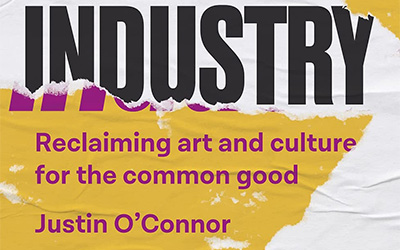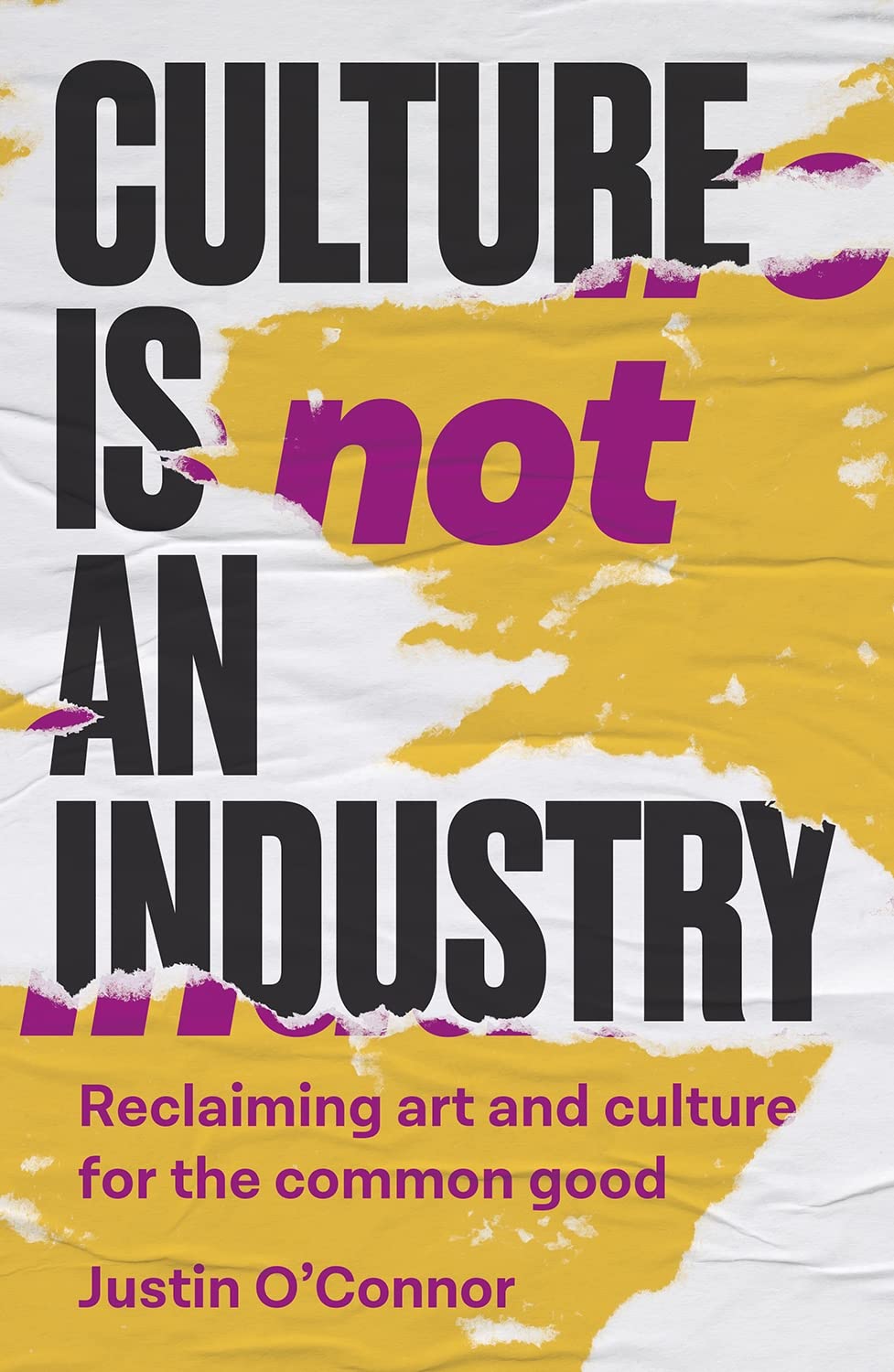
- Free Article: No
- Contents Category: Cultural Studies
- Review Article: Yes
- Article Title: Intractable definitions
- Article Subtitle: Questioning cultural industries
- Online Only: No
- Custom Highlight Text:
A book written by an English author and published by an English academic press with first-page references to New Labour, Conservative austerity, and Brexit might seem, at first glance, of little interest to or relevance for Australian readers. Yet anyone concerned with or about the state of the arts in this country and further afield will find much stimulus, provocation, and food for thought in the latest work of a prolific academic-activist entrepreneur who has occupied posts in three Australian universities since 2008, besides presenting at conferences and consulting widely with UN agencies and local and national governments throughout Asia, Europe, and the Pacific.
- Featured Image (400px * 250px):

- Alt Tag (Featured Image): Wilfrid Prest reviews ‘Culture is Not an Industry: Reclaiming art and culture for the common good’ by Justin O’Connor
- Book 1 Title: Culture is Not an Industry
- Book 1 Subtitle: Reclaiming art and culture for the common good
- Book 1 Biblio: Manchester University Press, $34.99 pb, 294 pp
- Book 1 Cover Small (400 x 600):

- Book 1 Cover (800 x 1200):

- Book 1 Readings Link: https://www.readings.com.au/product/9781526171269/culture-is-not-an-industry--justin-oconnor--2024--9781526171269#rac:jokjjzr6ly9m
Despite the standard scholarly apparatus of endnotes and bibliography, valuable resources in themselves, especially for those who (like me) possess only sketchy background knowledge of most of the ground it covers, O’Connor’s book is not aimed solely at fellow specialists in the relatively recently established fields of cultural studies and arts/culture policy. On the contrary, prominent among its virtues is an accessible, lively, witty, and at times mordant prose, deploying a remarkably rich and diverse range of reference, to (among others) Adorno, Ernst Bloch, Bourdieu, Foucault, Giddens, Habermas, Marcuse, Mazzucato, Nussbaum, Piketty, Polyani, Amartya Sen, E. P. Thompson, and Raymond Williams, along with the novelist Martin Amis and the rock star Brian Eno. O’Connor also generates some memorable images and phrases, including a ‘teenager’s bedroom, full of devices for consuming, making, and sharing cultural practices and products ... a meniscus containing a whole world in miniature’, and ‘the death rattle of statistics’ replacing our innate sense of the value of culture.
Some allusions to British politics over the past generation or so, let alone to ‘red wallers’ and ‘crap towns’, may be lost on non-British readers. But this one was pleasantly surprised to come across mention of Gough Whitlam and the Australia Council, Paul Keating and ‘Creative Nation’, as well as citations of local authors, including Tully Barnett, Julian Meyrick, Robert Phiddian, and John Quiggin. While O’Connor primarily addresses a British audience, these references come with no hint of condescension, cultural or otherwise, even if an endnote asserts that the phrase ‘creative industries’ was not first coined by Keating and his advisers, contrary to ‘wishful thinking from the group of academics who promoted the term – post 1998 – in Australia’.
It seems that Chris Smith, minister for a newly established Department of Culture, Media, and Sport in the 1997 Blair Labour government, had been a frequent visitor to Australia during the previous Tory UK ascendancy. Smith was particularly impressed by Keating’s vision of art and culture more generally as a potential economic powerhouse, which could not only generate jobs and income for those working in the ‘creative’ sector, but also help transform Australia from a colonial backwater dependent on primary production to a modern multicultural society and knowledge-based economy. Hence the birth of ‘Cool Britannia’ and New Labour’s ‘creative industry’ project, which harnessed a ‘whole new genre of “cultural consultants” ... a cottage industry with self-taught ex-artists, cultural activists, local government officials and academics (mea culpa) making it up as they went’.
So it turns out that O’Connor, having initially participated as a Manchester-based expert in Cultural and Creative Industries (CCI), became increasingly disillusioned and eventually determined to reject the original formulation and its associated dubious metrics altogether. His new book advances the central argument that culture, ‘as an object of public policy should be moved out of “industry” and back into the sphere of public responsibility alongside health, education, social welfare, and basic infrastructure’. For the ‘creative industries’, while never convincingly defined, have also failed to fulfil their promised economic destiny. Yet the widespread adoption of an economic cultural policy model reinforced the neo-liberal agenda of privatised consumption and a shrinkage of the public sector, highlighting the role of individuals in both creating and consuming cultural goods, while ignoring the ever-growing power of the real cultural industries – behemoth corporations and digital platforms, Alphabet, Disney, Fox, Meta et al. – in the mass media and across the internet.
What is to be done? O’Connor mounts a formidable case for re-conceptualisng culture as a fundamental human necessity and public good. He rejects attempts to distinguish between material needs and inessential wants (including art and culture, high and low). The rock art created by Australia’s First Peoples, the world’s oldest continuous living culture, points to a universal but uniquely human propensity for making signs and symbols. Art and culture provide us art-making animals, not driven solely by physiological impulse, with freedom to imagine different futures and criticise the status quo as democratic citizens, in ongoing conversations linking past, present and future.
Building upon the approach of the Foundational Economy Collective (FEC), a mainly European group of progressive social-scientific thinkers in whose Manchester Capitalism series his book appears, O’Connor proceeds to tackle the next obvious question: how can a collective culture best be established or re-established? His answers are framed in broadly strategic terms, as work in progress rather than detailed tactical prescription, involving a range of historical, geographical, and sociological perspectives, often in dialogue with other cultural and social policy theorists.
Essentially, the argument is for culture to be added to the ‘liveability’ measure now widely advocated as a more equitable and sustainable substitute for GDP. This would entail various forms of expanded public provision and support directed to ‘overlooked’ sectors of the cultural landscape, including households and local small enterprises like live music venues, independent bookshops and galleries, as well as routinely, if grudgingly, state-supported institutions like libraries, museums, and theatre companies. All this requires a far more robust rationale than pleas of market failure. Instead we must stress the positive economic, political and social benefits of investment in culture as part of ‘the commons’, indeed a transformed post-capitalist imaginary.
What makes his book important is O’Connor’s willingness to raise and pursue a series of complex issues about how we live and work today and into the future. As a relatively short text taking on a large field, it can seem a little under-cooked. Minor gaffes or typos can be corrected: the great French historian who wrote about Mediterranean markets was Fernand, not Fernando Braudel, while Matthew Arnold published Culture and Anarchy in 1869, not a century later. Some historical content not derived from the author’s personal experience, about the nature and roles of art and culture in pre-modern times, is also open to question.
Especially in the second half of the book, we are too often hurried along from one topic to the next when more leisurely development of the argument is called for, rather than a rhetorical flourish or two. The intractable definitional question of where art and culture end and something else begins (video games? coding? cricket? advertising?) is skilfully handled. But some resolution does matter, if only for public policy purposes and arguments about who gets what, which will always invoke taxonomy and statistics.
The utilitarian Jeremy Bentham (1748-1832) condemned all public subsidy for the arts, since ‘prejudice apart, the game of push-pin is of equal value with ... music and poetry ... Everybody can play at push-pin; poetry and music are relished only by a few.’ Countering that mindset in our own Benthamite times with principled arguments for maintaining and increasing state arts funding is no trivial contribution.


Comments powered by CComment